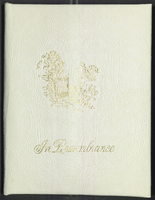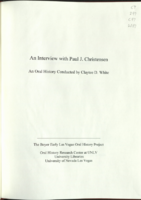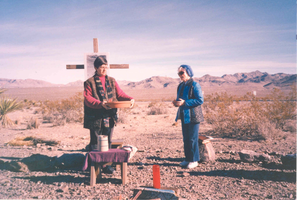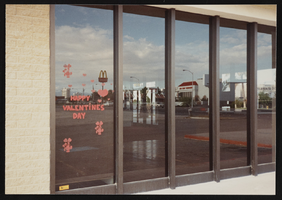Search the Special Collections and Archives Portal
Search Results

Mabel Hoggard: funeral guest book
Date
Archival Collection
Description
From the Mabel Hoggard Papers (MS-00565) -- Personal papers file. This funeral book from Palm Mortuaries and Memorial Parks, Las Vegas, is in memory of Mabel W. Hoggard. It contains religious quotes, poems, and signatures from family and friends. The book notes that services were held at Zion United Methodist Church.
Text
Wendell Bunker oral history interview
Identifier
Abstract
Oral history interview with Wendell Bunker on October of 1971 for the Ralph Roske Oral History Project on Early Las Vegas. Wendell Bunker (b. 1911 in St. Thomas, Nevada), discusses early Las Vegas, Nevada and the socio-economic changes that have taken place in the Valley. Bunker talks about the Boulder (Hoover) Dam and religion and education in Nevada. He also describes working for the Union Pacific Railroad and the importance of the railroad to the economic development of Las Vegas.
Archival Collection
John Brooks oral history interview
Identifier
Abstract
Oral history interview with John Brooks conducted by Jeff Kennedy on February 28, 1979 for the Ralph Roske ORal History Project on Early Las Vegas. During the interview Brooks discusses gaming, education, the early above-ground atomic blasts, the Boulder Dam, and social and environmental changes in Nevada. Brooks also discusses the Old Ranch, economic changes, religion, politics, family life, the Navy, sports, the railroad, Fremont Street, and the hotels on the Las Vegas, Nevada Strip.
Archival Collection

Transcript of interview with Samuel and Sherrill Coleman by Claytee White, February 12, 2016 and February 22, 2016
Date
Archival Collection
Description
Sherrill and Samuel Coleman moved to Las Vegas during the 1990s after both enjoying a full life and numerous careers in other parts of the United States. They met each other through church in 1998 and married each other in April 1999. Now retired, both Samuel and Sherrill remain active in their church community. Samuel Coleman was born in Durant, Mississippi in 1928 to a sharecropping family. His father died when he was 13 months old, leaving his mother to raise seven children by herself. Over time, his family slowly migrated to Chicago and he joined them when he was 15. For eight months, Samuel worked a number of different jobs until he began to work for Burlington Railroad as a four cook. The United States Army drafted him in 1951 and sent him overseas to work in a motor pool for a military hospital in Korea, despite his status as a conscientious objector. At war’s end, he returned to work for Burlington. During his last 17 years with the railroad, Samuel successfully petitioned to join the Brotherhood of Sleeping Car Porters, the union for railroad cooks, porters, and waiters, to improve the working and sleeping conditions at Burlington Railroad. He retired from the railroads in the 1970s and chose to pursue other careers. Until his official retirement in 1993, Samuel worked in real estate, as the owner of a liquor store, a firefighter, a restaurant inspector, and a deacon for his church. His daughter from his first wife moved to Vegas to pursue a career as a teacher and after a number of visits, Samuel decided to follow her in 1999. Sherrill Coleman was born in Newton, Kansas in 1941. Like many other African American women in her community, she worked as a housekeeper for a number of years. She and her first husband moved to Los Angeles County in 1964 where she took a temporary job in the elections department of the local government. In 1967, Sherrill became a file clerk for Los Angeles County’s Department of Public Social Services. By the time she left the department, she was middle management in the auditing department. She moved to Vegas in 1993.
Text

Transcript of interview with Paul J. Christensen by Claytee D. White, February 19, 2008
Date
Archival Collection
Description
Text

Sister Rosemary Lynch and an unidentified protestor on Ash Wednesday: photographic print
Date
Archival Collection
Description
Image

The Evangelism Training Center: photographic prints
Date
Archival Collection
Description
Image
Carole Fisher oral history interview
Identifier
Abstract
Oral history interview with Carole Fisher conducted by Barbara Tabach on December 14, 2016 for the Southern Nevada Jewish Heritage Project. In this interview, Fisher discusses her family background and moving to Las Vegas, Nevada in 1979. Fisher talks about Nathan Adelson Hospice, programs that they provide for the Las Vegas senior community, and the increase of hospices in Las Vegas. She describes how Nathan Adelson Hospice is able to provide care for uninsured people, fundraising events they organize, and how their hospice differs from traditional hospital care. Lastly, Fisher discusses the significance of death in the Jewish religion.
Archival Collection

Jewish Federation correspondence, meeting minutes, and other records, item 05
Description
A letter about local allocations from Hal Ober to the Board of Directors of the Jewish Federation of Las Vegas, Nevada. May 20, 1986.

